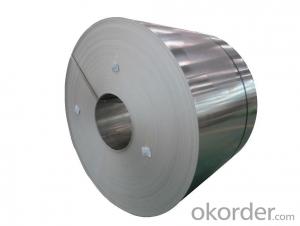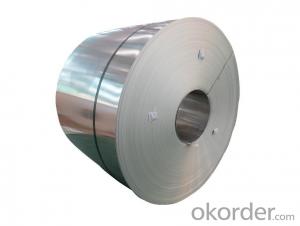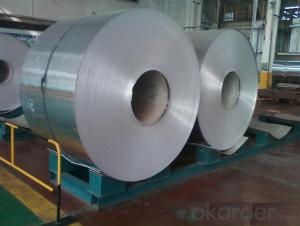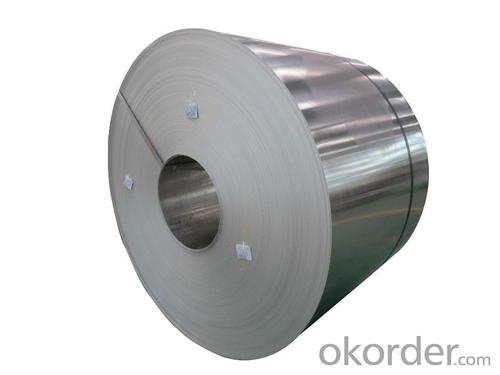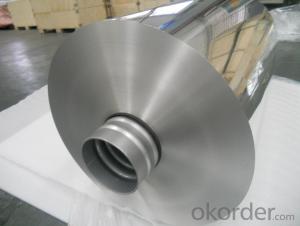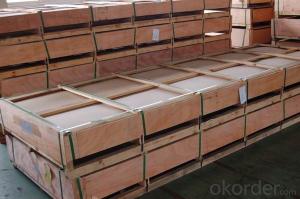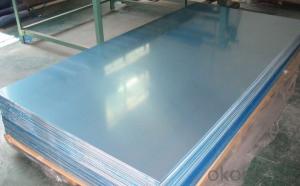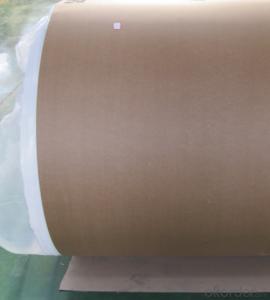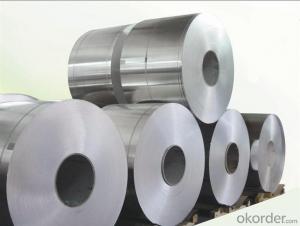Aluminum Foil Sheets DC Aluminium Strip in Coils AA1050 Temper F
- Loading Port:
- Shanghai
- Payment Terms:
- TT OR LC
- Min Order Qty:
- 80 m.t.
- Supply Capability:
- 60000 m.t./month
OKorder Service Pledge
OKorder Financial Service
You Might Also Like
1.Structure of Product Description
DC Aluminium Strip in Coil is one semi-finished aluminium material. This strip can be rolled down to aluminium coil,sheet,circle ect. The alloy AA1050 is widly used in building, industry ect. Its weight is much lower than steel. So many customers choosed aluminium material instead of steel.
2. Main features of the product
a.Competitive price
b.Professional after-sale service
c.Fast delivery time
3.Image
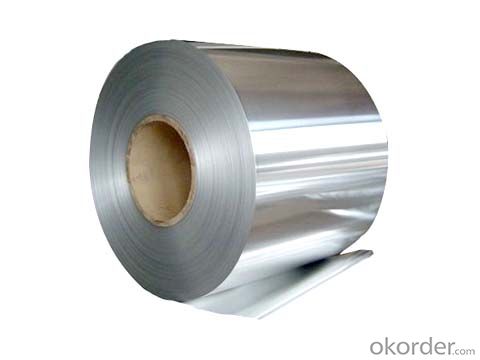
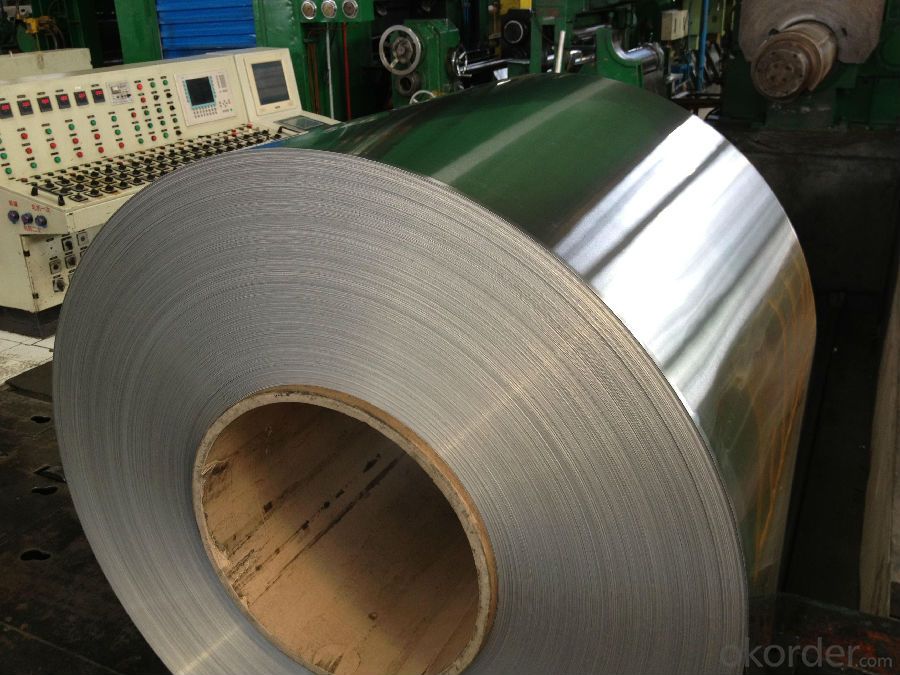
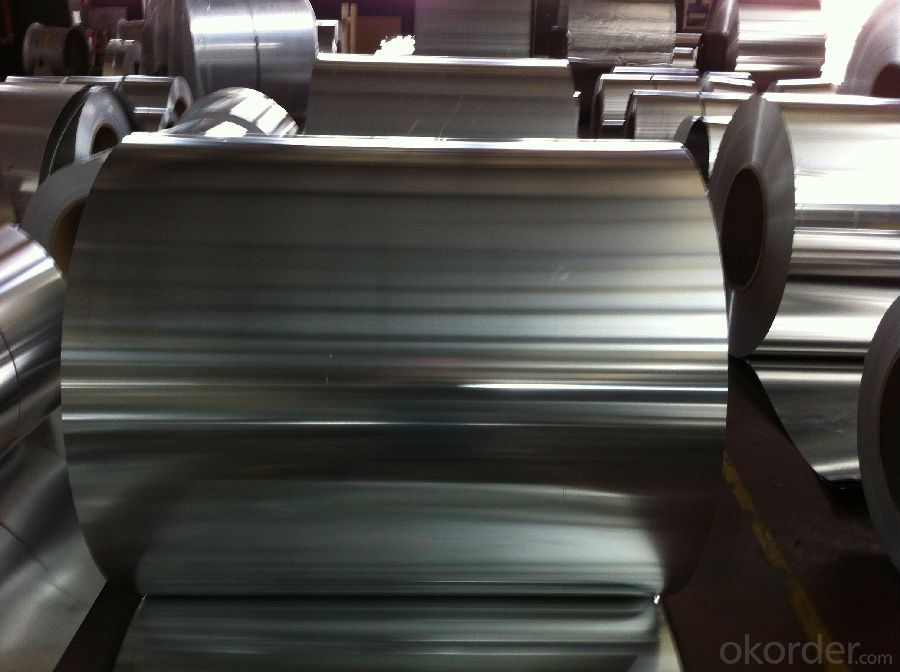
4.Products Specification
| Alloy | Thickness | Temper | Coil Weight | Coil ID | |
| AA1050 | 3-8mm | F | 5-6 MT | 610mm |
5.FAQ:
What is the quality standard?
---Usually our standard is GB3880-2006
What is the largest width?
---It is 2300mm
What is the MOQ?
---Usually we can accept 80 tons.
- Q: Normally, when I install a 30-amp dryer receptacle, the wire is #10 copper and I double over the end with lineman's pliers prior to landing it in the lug just to be extra tight. Today I replaced a dryer outlet wired with #8 aluminum SE. The quandaray I have is that the lugs seem made for #6 and the #8 just sort of flattens and divides under the screw. Is this safe? The doubling over move makes the wire way too thick for the lugs to close. I've been doing electric for many years and have never run into this. Should I go back and re-run the circuit (only about 30 feet) in #10 copper? What is the actual draw of a typical electric dryer on high heat, anyway? Thanks.
- I would actually replace the wire, I don't like old aluminum branch circuit wiring. If you don't replace the wire with copper then make sure you use some anti-oxidant. Usually elements use around 20-22 amps (240v) and the motor runs 3-5 amps (120v), so you need to wire for good connections full circuit capacity.
- Q: Can aluminum sheets be used for bus bodies?
- Yes, aluminum sheets can be used for bus bodies. Aluminum is a lightweight yet durable material that offers excellent corrosion resistance, making it a popular choice for constructing bus bodies. Its high strength-to-weight ratio allows for improved fuel efficiency and increased payload capacity. Additionally, aluminum can be easily molded and shaped, enabling manufacturers to design buses with unique and modern aesthetics.
- Q: Can aluminum sheets be used in the automotive industry?
- Aluminum sheets indeed find application in the automotive sector. Being a lightweight and sturdy material, aluminum offers several advantages when it comes to manufacturing automobiles. Car bodies, hoods, doors, and other structural components are commonly produced using aluminum. This helps in reducing the weight of the vehicle, resulting in improved fuel efficiency and enhanced performance. Furthermore, aluminum exhibits remarkable resistance to corrosion, making it ideal for vehicles that face harsh weather conditions. Moreover, aluminum sheets are easily formed, welded, and joined, which adds to their versatility and suitability for various automotive purposes. Consequently, the automotive industry widely embraces the utilization of aluminum sheets due to their numerous benefits.
- Q: How does aluminum sheet compare to other metals in terms of weight?
- Aluminum sheet is exceptionally lightweight compared to most other metals. It has a lower density, making it a popular choice for applications where weight reduction is a priority.
- Q: What is the typical wear resistance of aluminum sheets?
- The wear resistance of aluminum sheets can vary depending on the specific alloy and temper. Typically, aluminum sheets exhibit a moderate level of wear resistance compared to other metals. However, they do not possess the same level of wear resistance as materials like steel or titanium. Aluminum sheets can endure light to moderate wear and abrasion, making them suitable for applications that do not involve excessive friction or impact. To improve the wear resistance of aluminum sheets, various treatments such as anodizing or painting can be applied to their surface. Furthermore, the wear resistance of aluminum sheets can also be influenced by their thickness and hardness. In general, thicker and harder sheets tend to offer better resistance against wear.
- Q: Can aluminum sheet be used for automotive body panels?
- Yes, aluminum sheet can indeed be used for automotive body panels. Aluminum is a lightweight and corrosion-resistant material, making it desirable for improving fuel efficiency and increasing vehicle performance. It is widely used in the automotive industry to manufacture body panels, such as hoods, doors, fenders, and roofs, as it offers strength, durability, and design flexibility.
- Q: Why does the glue of the aluminium curtain wall glue bubble? At the same time, do not bubble on the side glass, what is the reason?
- Brothers, there are several kinds of bubble gum, first to check is not part of the foam glue strip plug is not good, should be smooth, playing in a plastic bubble, not to leave the air, also can't have water, air water will bubble. In addition, glue when the temperature is very important no, when hot hit. Glue master experience play a decisive role, there is a great work in absolute don't let coolie, evenness and speed are very important.
- Q: Can aluminum sheets be used for outdoor furniture?
- Yes, aluminum sheets can be used for outdoor furniture. Aluminum is a popular choice for outdoor furniture due to its durability, lightweight nature, and resistance to rust and corrosion. It is commonly used to make outdoor tables, chairs, and other furniture pieces.
- Q: What are the electrical conductivity properties of aluminum sheets?
- Aluminum sheets possess excellent electrical conductivity properties. Due to its low electrical resistance, aluminum is widely used in various electrical applications. It has a high conductivity rating, only slightly lower than that of copper, making it an effective conductor of electricity. This property allows aluminum sheets to efficiently transmit electrical current with minimal energy loss. As a result, aluminum is commonly utilized in power transmission lines, electrical wiring, and electrical connectors. Furthermore, aluminum's conductivity makes it suitable for applications that require heat dissipation, such as heat sinks in electronic devices. Overall, aluminum sheets are known for their favorable electrical conductivity, making them a preferred choice in numerous electrical and electronic applications.
- Q: Are the aluminum sheets suitable for outdoor applications?
- Yes, aluminum sheets are suitable for outdoor applications. Aluminum is highly resistant to corrosion and weathering, making it an ideal choice for outdoor use. Additionally, aluminum sheets are lightweight, durable, and have excellent thermal and electrical conductivity, further enhancing their suitability for various outdoor applications.
Send your message to us
Aluminum Foil Sheets DC Aluminium Strip in Coils AA1050 Temper F
- Loading Port:
- Shanghai
- Payment Terms:
- TT OR LC
- Min Order Qty:
- 80 m.t.
- Supply Capability:
- 60000 m.t./month
OKorder Service Pledge
OKorder Financial Service
Similar products
Hot products
Hot Searches
Related keywords
